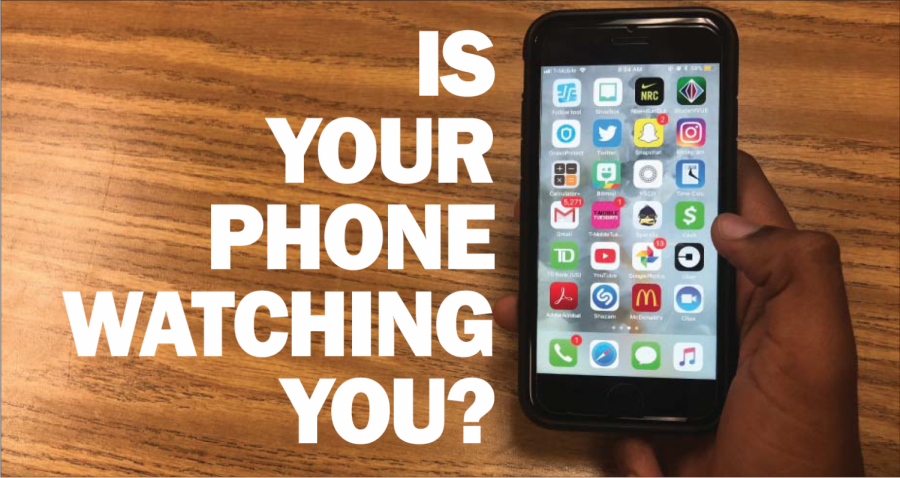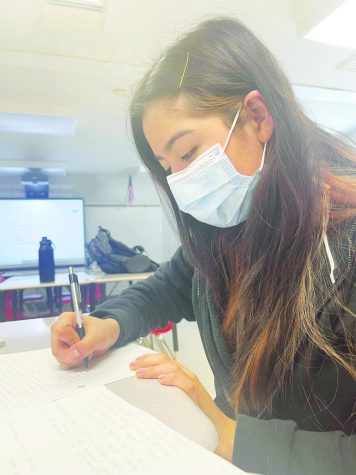Is your phone watching you?
Students question how much mobile data is watched by administration and staff
Like many students, senior Benjamin Lee takes advantage of the school’s free WiFi network instead of using his cellular data throughout the day. From R1 to lunch and all the way until dismissal, his phone lights up with various notifications and texts. As he responds each message, Lee wonders if anybody else in the school system is able to see his private conversations.
How much mobile data and activity can school officials, government and marketers actually see?
Due to the increased usage of smartphones around the world and the sharing of personal information through online activity, the protection of personal information online has been especially relevant in recent years.
FCPS uses a program called WebSense in its networking system to determine which websites and applications to block. The types of sites blocked is determined in regards to the school board policy.
“I know they [the school] WPA2 security which basically incorporates window certificates to connect to the WiFi, which is how students connect to the network,” AHS Technology Support Specialist Brent Litherland said.
The school network does not actually collect or pull data from students’ daily use. The only time student data is analyzed if there is suspicious or malicious activity.
“For instance, if an issue came up where they got a user’s device was infected or is causing a lot of network bandwidth then the school officials will look into the data,” Litherland said. “Not unless it is red-flagged. Either they are looking at inappropriate content or torrenting and stuff like that. If they bring a red flag to our attention then we’ll obviously be looking into that.”
If a student violates the Acceptable Use Policy (AUP), then FCPS has the right to investigate all devices and activities on the FCPS network, including all Bring Your Own Devices (BYOD) devices.
According to the Students Rights and Responsibilities Handbook’s Search and Seizure policy, if school administration has a reason to believe a student is dangerous, they may search his or her electronic device while on school property.
In bullying circumstances, consent would be first obtained before the student’s phone is opened.
“With their permission, I’ll take pictures of them [the messages] if I’m going to work the case if it rises to the level where it might be a crime,” School Resource Officer Adam Curcio said. “A lot of times it may not actually be a crime because bullying itself is not a crime depends on what the messages are, how they’re sent and what their content is.”
In criminal cases, the ACLU cites the Fourth Amendment of the Constitution to protect the rights of citizens in regards to technology. Courts and police need to obtain a warrant and probable cause before accessing the device. However, this changes while on school property.
While school officials admit they do not regularly collect student data unless they find something suspicious, it is now an open secret that the government surveils its citizens.
The National Security Agency collects billions of records a day to track the location of mobile phone users around the world. Most recently, the Department of Homeland Security acknowledged that they listen in on phone calls by pretending to be a cell tower, forcing nearby devices to connect before the signal goes to an actual tower.
Facebook also admitted that it was targeted by hackers who were able to take advantage of search tools on the website, giving them access to the identities and information of over 87 million of its users, including 71 million Americans. These hackers were a part of Cambridge Analytica, which is a political consultancy hired by Donald Trump and other Republicans.
Although data breaching to such an extent may seem like something that rarely occurs, experts urge students to be careful of what they are sharing. Mobile devices are constantly tracking every movement the user is doing. Pop-up advertisements that target specifically to the user’s personal taste are a result a system analyzing most recent data and the overall interest of the phone owner.
Like using computers, this is done through the sharing of online cookies, a small piece of code that allows ad networks to share information on consumers view or buy, with other companies. There are also false ads and apps such as Total Trivia, Portal Quest and Sniper 3D Assassin that lure users into accidentally downloading a virus onto their phones.
There are quick ways to protect personal information such as disabling the camera and microphone function in certain apps, shutting off location services on phones, using private social media accounts, using cellular data rather than an unknown public WiFi network and regularly update apps.
The seriousness of data breaching and mobile security has drawn in mixed opinions.
“I feel that data breach for someone that does not have a high position of power in society is not important at all,” senior Augusto Gonzalez said. “There is no incentive for a hacker or someone that’s working in the field of cybersecurity to take their information. The information they would find would not benefit them in any way shape or form.”
Another method is downloading a VPN, which is a Virtual Private Network. A VPN consists of discrete networks that are connected through a public network. People can use VPNs to secure and encrypt their activity online when they use an unfamiliar public network.
“I decided to download a VPN a few years back to get around some of the blocked sites that the school system has set,” Lee said. “I also did a lot of research and found it beneficial for my own data safety.”
Mobile devices have taken a significant role in society. Even though they make interacting and the sharing of events in daily life easy, it is also important to keep in mind the dangers that arise with oversharing.
“It really isn’t hard to learn about how you can easily find ways to protect sensitive information from other people,” Lee said. “You never want strangers tracing every footstep you take online.”
Being a responsible and observant user while practicing safe methods of technology can help keep personal information away from prying eyes.

Senior Binqi Chen is the current Co Editor-in-Chief of The A-Blast. She has been on staff for four years and previously served as the In-Depth Editor as...












